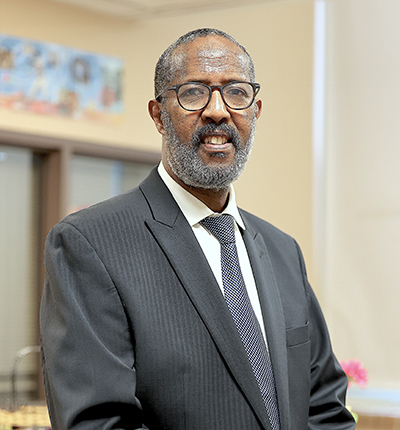I was born in the Somali Region of Ethiopia, where my early years were spent living as a nomad, tending to livestock. Without access to formal education, my learning took place in a Dugsi, a Qur’an memorization school. My life took a significant turn when, at the age of 8, my older brother, who was teaching in Nigeria, brought me from our village to Nigeria. There, I had the opportunity to complete my elementary and secondary education. Later, I moved to Saudi Arabia, where I pursued and obtained my bachelor’s degree in English.
In 1991, I arrived in America, eventually settling in northern Virginia/Washington, D.C. My first impressions were filled with the hope of realizing the American dream. The sheer power and presence of Washington, with its iconic landmarks, was overwhelming.
Upon my arrival, I stayed with a family friend who kindly introduced me to the local mosque and community spaces. This introduction was pivotal in helping me establish connections and integrate positively into the community. Finding a job proved to be a significant challenge. After countless applications and interviews, I finally landed a job as an interpreter of English and Arabic. In 1996, I relocated to Minnesota, where I have been actively involved in the education, religious and civic spheres ever since.
Navigating life as a refugee in a new country came with its own set of challenges. One of the toughest was dealing with the multitude of services and institutions designed to help newcomers. Another significant challenge was maintaining my faith and traditional practices in a system that didn’t recognize them as part of daily life. Overcoming these challenges required advocating for myself and educating others about my needs in a multicultural society.
Throughout my journey, I encountered several stereotypes and misconceptions about refugees. One common stereotype was being labeled a “terrorist” in grocery stores and workplaces. These Islamophobic attacks motivated me to become a public advocate for building bridges of understanding among communities. Over time, there has been a greater understanding of people from my background, and things have improved significantly.
Success, to me, is being comfortable with who you are, both internally and externally, by developing your skills and striving for the common good of society. It is not measured by wealth or power but by balancing this life and the hereafter. What keeps me driven is the desire to contribute positively to society and ensure that my work benefits others.
Reflecting on my journey, I am humbled and grateful for where I am today. I have raised a family with grown-up children, obtained a Doctor of Education degree and currently serve as the proud principal of the East African Magnet School in St. Paul. Additionally, I served on the Fridley School Board.
My current focus is on leading the East African Magnet School and ensuring that the students, staff and community achieve their aspirations in life. I am deeply committed to providing a responsible, respectful and relevant quality education for each student at EAMS.
To other refugees navigating their way in a new country, my advice is this: Honor and respect the Native American communities who are the original settlers of this land. America is a land of immigrants, and it does not matter when you or your ancestors arrived. Have faith in yourself and hold onto your values to enrich the American development that you are part of. Your voice and contributions matter. America needs you as much as you need America. Be patient and approach every opportunity with confidence, making spaces better than you found them.
